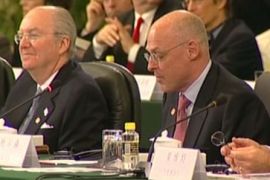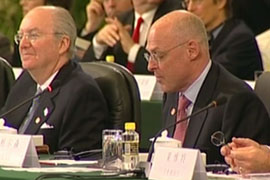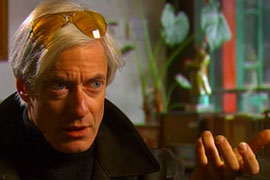Made in China, worrying the US
China’s surging economy is causing worry in Washington.

 |
| Exporting everything from cheap toys to laptops, China’s trade surplus with the US is soaring |
What does George Bush want for Christmas? Aside from an end to the troubles in Iraq, he would probably like to see his trade deficit with China disappear.
But Santa is unlikely to deliver that, even though most of what he is carrying will have been produced in China.
Keep reading
list of 4 itemsWhy are nations racing to buy weapons?
Parallel economy: How Russia is defying the West’s boycott
US House approves aid package worth billions for Ukraine, Israel
It is not just cheap toys the world comes shopping for in China.
High-tech IT products, clothes and 70 per cent of the worlds Christmas decorations are just some of the billions of dollars worth of exports leaving China’s factories for the rest of the world.
If you are wearing it, playing with it or working on it, it is probably made in China.
So that’s why Henry Paulson, the US treasury secretary, traveled half way around the world this week to knock on Beijing’s door, bringing with him the head of the federal reserve, the US trade representative, and a third of the US cabinet.
It is a bit like coming to see the bank manager, knowing you have a very big overdraft.
Vulnerable
 |
| Paulson’s high-level delegation indicated the huge importance of the US-China relationship |
The United States is buying massively from China but selling little back.
The resulting deficit is more than $200 billion – and rising fast.
And Washington is also very vulnerable.
During George Bush’s term in office, the US Government has funded its budget deficit by selling US dollar treasury bonds, a trillion dollars of which were brought by China.
What Washington wants, is for China to revalue its currency, effectively restructuring their debt.
But opening the door to Chinese markets and playing with the value of its currency could be a very bad idea.
The economy here is still fragile, and many economists think forcing it open could go very wrong.
“The opening of China’s capital markets – ultimately it’s that card that he (Paulson) wants to play and that’s what he wants to win,” says political economist and author Laurence Brahm.
Scapegoat
 |
| Brahm: US motivation has little to do with economics |
In turn, he says, that would open the Chinese capital market to massive outside financial services corporations – an area which the US dominates.
The motivation actually has very little to do with economics, says Brahm, and far more to do with the administration in Washington looking for someone to act as a scapegoat for falling jobs in the American manufacturing sector.
The problem from Beijing’s point of view is that that would expose the underbelly of the Chinese economic system.
That would leave China vulnerable not just economically, but strategically and politically, according to Brahm, which he suggests may be Washington’s real objective.
The last time an Asian economy was subject to serious speculation, it prompted the Asian crash of 1997.
When speculation started to drive down the value of the Thai Baht then, it sent most of Asia’s markets tumbling into a depression that many are only now recovering from.
Bubble burst
 |
| Although it is booming, China’s economy remains fragile |
If that happened to China today, it would almost certainly take the rest of the world with it.
But are ordinary Chinese worried? Most spend little time worrying that currency fluctuations might affect their personal lives or finances.
If the US pushes too much, however, it could burst the Chinese economic bubble. Severe job losses and unemployment that would cause major problems.
Currency revaluation, budget deficits and trade imbalance are not something most people spend a lot of time thinking about.
But China is now a major part of the global economy, so if something goes wrong with the economy here, it is likely to be very bad news for all of us.